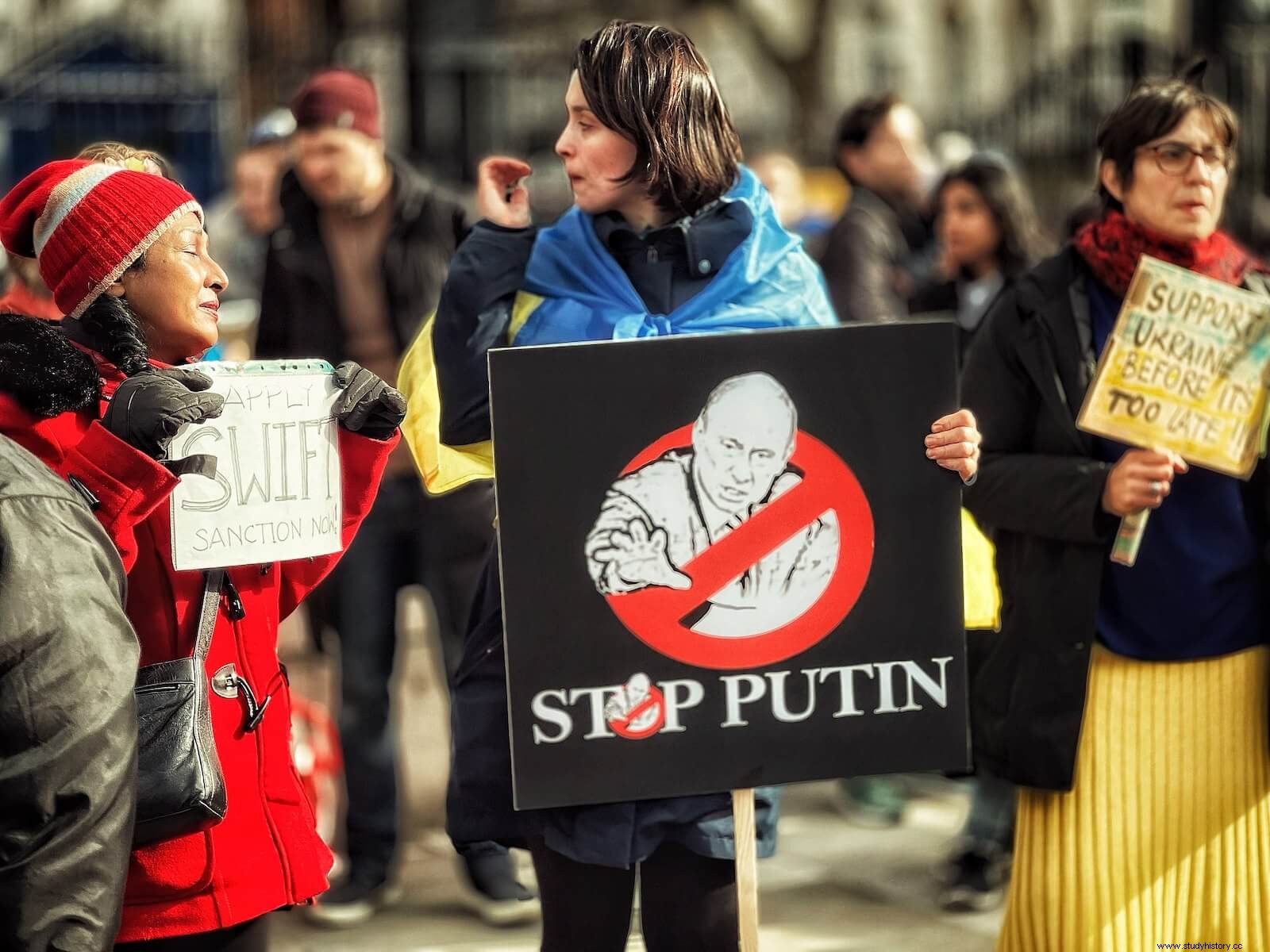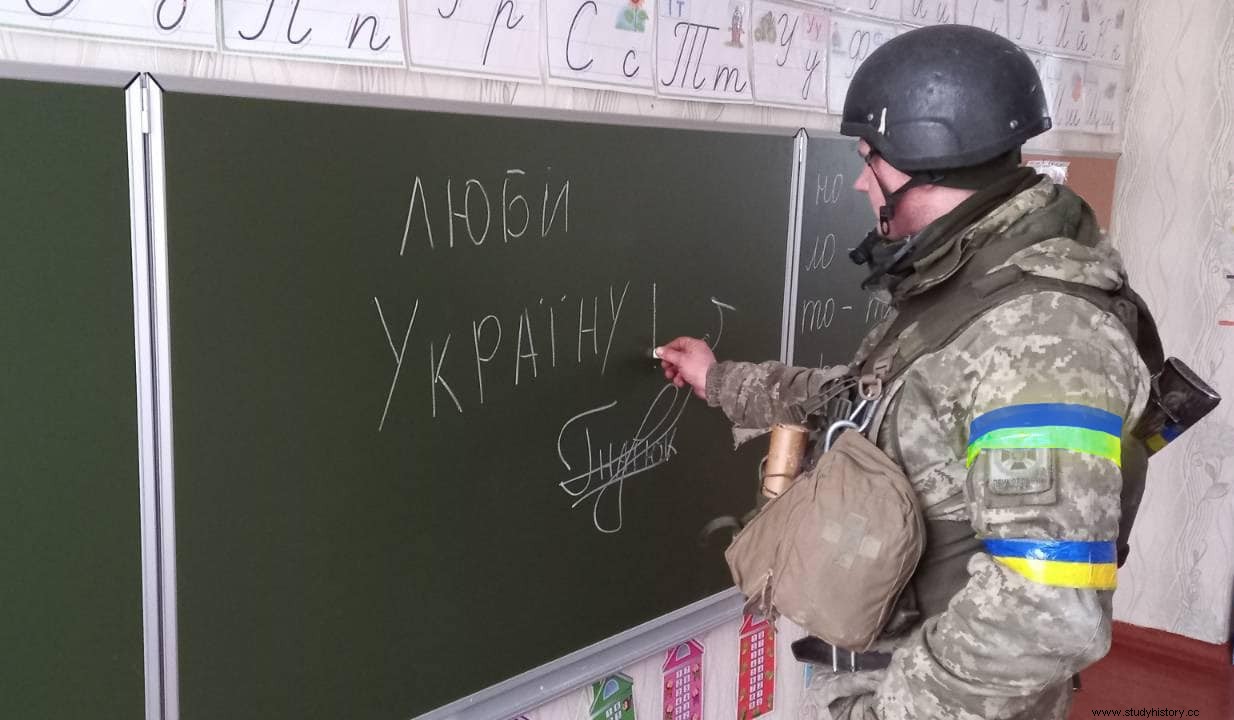
Any war, in its traditional (conventional, unconventional, regular, irregular, guerrilla, subversive, revolutionary, etc.) was always analyzed in its “before” (the causes:distant and immediate), its “during” (the war event itself) and its “after” (the effects on the winner, on the loser and on others outside of such qualifiers), and was analyzed through descriptive narratives of what happened in each of those moments, approaching, despite attempts at objectivity, one or the other side combatant according to the ideological implications of each one.
Currently, war, defined in another way (asymmetric, hybrid or whatever you want), although deep down it continues to be the same horror, has, for analysis, some means available, both by the enemies in presence and by allies, related, with a greater reach in society, which allows, through immediately commented images, to see partialities of it (generally not of the war in its whole).
Thus, war enters (what is wanted to enter) into our homes as if it were a movie or parts of it. A film that many times, in addition to being exploited by the interested propaganda of each of the intervening hostile wills, is also sometimes distorted, consciously or unconsciously, by the media that expose it.
Images, then, collected with explanatory eagerness by the press and television, become the background basis for debates, more or less objective, about what is happening and about what , presumably, is going to happen, pushing us, in some way, to take sides.
And that is what is happening with the war between Russia and Ukraine , a war that interests us, as Europeans, because of its geographical proximity and because of who the enemy is (defined in advance).
A war that, in addition to worrying us about fear/respect for its extension on European soil, provokes us, especially if we are on the enemy's list for any reason, old or new. supervening, all kinds of considerations, some right, wrong and others contradictory.
Coffee analysts in the Russia-Ukraine war
And so far so good if the analysts , regardless of their status –military, politicians, diplomats, academics, political scientists, economists, journalists (war correspondents or not, or others dedicated to the subject), etc.– are deeply knowledgeable about what they are talking about, what they expose, putting in value their words with their updated training on the subject.
But no, what is being observed is a constant bombardment of information in all kinds of media and programs by some commentators, debaters, etc. who, without the necessary knowledge on the subject, tell us about the Russia-Ukraine war even absorbing the lies of each side , or those of his followers; bombardment of information that tires and confuses those interested in the conflict, those who seek objective knowledge of reality based on the most truthful information and analysis possible. And even though we are only a few days away from its start, what will happen if the war continues over time?
People, the citizenry, want to believe, to trust that reality is being described to them and not navigate through confusion, and even more so if they realize that such a Perhaps it is being directed, manipulated. It is clear that there is a need for information and that the media must provide it, but information that must be well exposed and well analyzed, without competing for the audience, since then subjectivity frequently appears.
And it is that the seriousness of the war information (about the "before", the "during" and the "after" mentioned) cannot be left in the hands of certain “experts”, tacticians or strategists of opportunity , which were previously called "coffee", nor in those that entered a long time ago, as far as knowledge is concerned, in a period of obsolescence (one-eyed now in a world of blind people), an obsolescence that they do not want to recognize speaking ex cathedra .
They are all those who, applying themselves, in many cases, with basic ignorance, more to the art of war than to the art of peace (generally non-existent), talk and talk, debate and they debate about the no or the yes to the war, about the involvement or not in our politics, about the ideology of the contenders, about the personality of the leaders, about whether it is a question of a full-fledged invasion or not, about whether the war will be long or short, about who is winning it, about who will certainly win it (and therefore about who will lose it), about whether or not definitive weapons will be used, about the slowness or speed of advances and their consequences. limitations, on the changing demands of the contenders to achieve peace, on the possibility of agreements, on the type of support or not to provide and how, on the simple or multiple influence of the imposition of sanctions, on the possibility or not of European and world conflict, about who will be, in that case, next to each other, about the consequences of the war on the citizenship of both contenders, etc.
Necessary debates, and possibly some more, that should be on the tables of conflict analysts, in those of the intelligence services, in those of our governing bodies, to deal with to see clearly what is happening and to have sufficient elements of judgment to decide, when it is necessary to decide... And, for this they will have to listen to the real experts.
“The first casualty of war is the truth”
It is often said that to resolve a conflict you have to listen carefully, objectively, without confusing noise, to the parties, to all, immersed in it. But here and now we, ordinary people, who do not have the capacity for such a resolution (perhaps in part through a certain social pressure), we only attend, every day, to an accumulation of information, in some cases repetitive , and to the analysis of Russologists and Ukrainian “experts” born at the time of the war , without deep prior knowledge, who pretending to be right in what they say (they do it with any subject) are capable of refuting the real experts, those without quotes (which do exist). These "experts" are the ones who talk about what is known and what is not known about said war and, even, like a kind of Nostradamus, about its immediate and distant future.
Russian and Ukrainian “experts” who present us with the war under the dichotomous prism of either good or bad, black or white, opting for a single position according to their logical interests, without care about the manifest truth.
“Experts” who forget that every war is difficult to analyze if you don't have all the information/global intelligence (which sometimes is not correct and complete either) about it; information/intelligence that has been attended to for a long time, before the conflict, and constantly updated/contrasted. It is difficult to obtain, since it is mostly hidden in the minds of the directors of each of the parties in conflict (it is part of the secret and the surprise attached to it of each contender).
And what to say when such “experts” bring their considerations to the political debate using their own conclusions, raised to convictions, at the level of a “throwing weapon”.
In all of this, it is one thing to point out a position in the conflict and quite another to give an unfounded opinion, and even worse to try to indoctrinate.
What is being seen is a large amount of analysis, especially war, on the evolution of the Russia-Ukraine war and its future, based on assumptions (own or others), and to opinions based on such assumptions; assumptions that are taken for granted. In this field, it would be important and necessary to ask such types of "experts" what their sources of information are, those that maintain their assertions and hypotheses.

Thus we find Russologists who, knowing everything about Russia, from our position of geographical and ideological proximity (already old before a communist enemy that would invade Europe and that we would end up in the Pyrenees), mark the foundation of a current Russophobia, a negative phobia against him as an attacker; and, at the same time, with some ukraniologists who know everything about Ukraine, who, due to their opposition (rightly so) to the Russian military penetration in their territory, point to a ukraniophilia, a feeling in their favor as attacked, as victims of the Russian aggression (which has led to excellent reactions of solidarity).
And here there are no limits, with a serious ignorance about reality:the reason for the conflict , of its causes, and of the true intentions of each part, visions found with said reality/truth are provided; a truth/reality that is left, on purpose, sometimes, in the field of the unfinished, in that of not “getting wet”, or else it is modified whenever it is considered appropriate. Some critical voices have already been heard about it,
We are therefore in a field of analysis that some may describe as critical, while others will simply describe it as cretinous.
When it's all over (hopefully sooner rather than later), at the moment of silence from the guns and the media noise, it will be time to collect the hard data and analyze the past to develop, by the truly experts, a work that will form part of political, military, economic history, etc. of the conflict; work that for its correct application to subsequent teaching should also include not only the most objective possible explanation of what happened "before", "during" and "after" it, but also a part related to the phenomenon of the appearance in what means of those "experts", explaining who was not and who was right, pointing out above all those who departed from the objective truth, from its foundations, and put themselves with their clarifications, nuances, opinions, etc. for the sake of freedom of expression (and opinion), perhaps out of a desire for protagonism (without taking into account other possible interests), alongside an opportunistic "truth".
